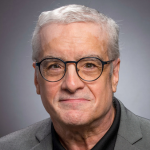Professor Emeritus
Areas of Interest
immune regulation of post-transplant vascular disease and allograft rejection, transplantation and heart failure outcomes research
Biography
Dr. James F. George is a Professor Emeritus of Surgery for the Division of Cardiothoracic Surgery. He is a molecular and cellular biologist who has worked in the field of heart failure and transplantation for more than 20 years. He is actively involved in researching the basic biology of heart failure and transplant rejection, the development of new drugs, and clinical outcomes after cardiac surgery and transplantation.
His studies are concentrated on transplantation immunobiology, particularly in relation to allograft vascular disease, immune regulation, and the role of heme oxygenase-1. Dr. George has pursued investigations into: the role of Heme oxygenase-1 in arterial thrombosis, and the development of post-transplant vascular disease, one of the largest limitations to long-term heart transplant survival; the mechanisms of clinical benefit from extracorporeal photopheresis, through a clinical treatment involving the exposure of peripheral blood mononuclear cells to ultraviolet irradiation; the development of unique rodent-based animal models in acute kidney injury, including ischemia-reperfusion and unilateral ureteral obstruction; and the molecular mechanisms of immunological tolerance.
Dr. George also has a substantial interest in clinical outcomes research as it relates to transplantation and heart failure.
Selected Publications
Hull TD, Agarwal A, George JF. The mononuclear phagocyte system in homeostasis and disease: a role for heme oxygenase-1. Antioxid Redox Signal. 2014 Apr 10;20(11):1770-88. doi: 10.1089/ars.2013.5673. Epub 2014 Mar 3 PMID: 24147608
Lara DA, Olive MK, George JF, Brown RN, Carlo WF, Colvin EV, Steenwyck BL,Pearce FB. Systemic effects of intracoronary nitroglycerin during coronaryangiography in children after heart transplantation. Tex Heart Inst J. 2014 Feb;41(1):21-5. doi: 10.14503/THIJ-12-2704. PubMed PMID: 24512395;PMCID: 3967485 PMCID: PMC3967485
Higgins RS, Brown RN, Chang PP, Starling RC, Ewald GA, Tallaj JA, Kirklin JK, George JF. A multi-institutional study of malignancies after heart transplantation and a comparison with the general United States population. J Heart Lung Transplant. 2014 May;33(5):478-85. doi: 10.1016/j.healun.2014.01.862. Epub 2014 Jan 28. PMID: 24630406
Carlo WF, Pearce FB, George JF, Tallaj JA, McGiffin DC, Marques MB, Adamski J, Kirklin JK. Single-center experience with extracorporeal photopheresis in pediatric heart transplantation. J Heart Lung Transplant. 2014 Jun;33(6):624-8. doi: 10.1016/j.healun.2014.01.863. Epub 2014 Jan 29. PMID: 24661684
Mazimba S, Tallaj JA, George JF, Kirklin JK, Brown RN, Pamboukian SV. Infection and rejection risk after cardiac transplantation with induction vs. no induction: a multi-institutional study. Clin Transplant. 2014 Sep;28(9):946-52.doi: 10.1111/ctr.12395. Epub 2014 Jul 25. PMID: 24930563
Education
Graduate School
University of Cincinnati
Master of Science, Biology
Graduate School
University of Alabama Birmingham
Ph.D.
Contact Information
Campus Address
LHRB 790
ZIP 0007
Phone
205-934-4261
Email
jfgeorge@uabmc.edu
